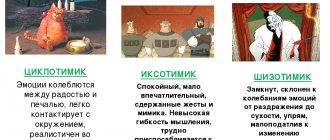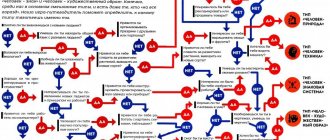We roughly know what kind of character we have. However, it often surprises even ourselves, so it is better to look deeper into the soul to know what to expect from yourself. Each of the 10 character tests presented is a unique opportunity to learn something new about yourself. And this will help you become better, change yourself.
Description of character by the manner of your speech
Learn something new about yourself, or confirm explicit information about your character traits. Take an interesting character test, which in the vast majority of cases is quite true. Based on the words you use most often, we'll tell you some facts about your personality traits.
We are sure that you really enjoyed taking such interesting tests. They allowed you to look at your character from different angles. Perhaps you will reflect on the results obtained, and now you know how to make yourself even better.
Comment
GuruTest
Each person has an individuality, which is mainly determined by the characteristics of his character. One may be more hot-tempered, another is more patient, and the third is simply indifferent to everything that happens. It is character that includes certain traits of human psychology and behavior. It is studied by the corresponding science - characterology.
Characterology: what is it?
Psychologists define characterology as a science that studies character, as well as the principles by which it is formed. Theophrastus, an ancient Greek thinker and writer, is usually mentioned as its founder. It was he who made the first attempt to systematize character types, proposing to divide people into 31 types.
Until now, the question of the number of character traits is quite controversial, and each scientist considers it in his own way. This is due to the fact that each person has a unique, inimitable set of qualities, so it is very difficult to type character. In addition, among us it is rare to find representatives of a “pure type” of one or another character.
How to find out your real character?
The most popular classification of characters was developed by psychotherapist Mark Evgenievich Burno. He identifies 8 character types.
Cycloid. A representative of this type is a true cheerful sanguine person. He freely expresses his own emotions, and also readily responds to the feelings of people around him or special situations. A cycloid can be defined by spontaneity, openness to everything new and unusual. He often strives to get the maximum amount of pleasure from life, and can also inspire others to do the same.
Epileptoid. Such a person is distinguished by an authoritarian, strong-willed character, pride and straightforward expression of intentions and desires. Such a person is a real politician who usually looks respectable and impressive, often rather ponderous. Epileptoids are distinguished by their will to win and the desire to be first and foremost. Many of them are constantly in emotional tension.
Psychasthenic. Psychasthenic can be identified by a timid, indecisive facial expression. He is prone to suspiciousness, and at the same time feels almost physical pain if he acts unkindly towards others. Such a person often focuses on the mistakes and failures of the past, which affects his productivity in the present and prevents him from achieving his goals.
Asthenic. A person of this type of character usually has exceptional vulnerability, reacts sharply to insults and can be quite irritable. An asthenic person can remember for a long time the circumstances under which his pride was hurt, as well as those people who dared to do it. A person with an asthenic character is often timid in front of strangers, but can be aggressive at home.
Anankast. This type of character is also called pedantic. Its owner is prone to precision, scrupulousness and pettiness. The thought that illness, death, or some other misfortune may overtake him gives such a person painful experiences. He is afraid of problems and troubles and is often tormented by remorse.
Schizoid. The character of a schizoid is based mainly on his internal feelings and experiences. The determining role for him is played by his attitude towards various phenomena and people, the emotions that he himself experiences. In love, a schizoid is rather reserved and may be more devoted to dreams of a partner than to the desire for real interaction with him.
Hysterical. A representative of the demonstrative type is usually distinguished by excessive posing and ambition. He involuntarily wants to attract attention to himself, for example, by loud behavior or extravagant clothing. In the stories of hysteria, there is clearly an exaggeration of some details, which is associated with the desire to emphasize its unusualness and make it more impressive.
Unstable character. The owner of an unstable character is usually characterized by immaturity and gentleness. Such a person is very malleable and easily suggestible, so he needs to beware of bad company and various bad habits. For an unstable person, thoughts about aging and unfulfilled desires bring particular stress.
Some psychologists also distinguish the degree of severity of one type or another. It can focus attention on certain traits, and sometimes take a more radical form - preventing a person from successfully communicating with others.
Our Yandex.Zen channel always has the most interesting articles on this topic. Be sure to subscribe!
01.05.2019 01:01
Are a person’s character traits predetermined from birth?
Everyone knows that temperament and external characteristics can be inherited not only from parents, but also from previous generations based on genotypes. But are character traits genetically transmitted? Scientists have come to the conclusion that character traits and inclinations are not inherited; they can only develop over time under the influence of family, environment, and in the process of education. A child can adopt certain habits from his parents and try to be like them, thereby shaping his character.
Character traits are not inherited
Superficial and deep personality traits
Superficial properties are something that is not characteristic of a person as a whole, but sometimes manifests itself in particular cases. For example, a generally cowardly person can act bravely and stand up for a girl on the street. This episode will not make him brave, he will remain cowardly, but it will show that “he can, if he wants.” It is important to understand that in a similar situation in the future the property may not appear. Knowing the superficial characteristics of an employee’s personality helps to understand in what cases he can act in a capacity that is unusual for himself. In the case of an opponent, this helps to weigh the risks more competently.
Deep qualities are innate, like temperament, and often serve as a direct consequence of it. For example, a melancholic person has a stable set of deep properties: he is a pessimist and a loner. A sanguine person, on the contrary, looks to the future with hope and usually loves people. Choleric is rash and explosive. The phlegmatic person is unperturbed.
Deep properties differ from primary character traits in that they are fundamental, they cannot be changed, they were not formed under the influence of circumstances. The ability to correctly identify them will allow a competent negotiator to tune in to the same wavelength as his interlocutor. This happens in the same way as adjusting to the speed of another person’s gait, since temperament is speed. In the stream of people, some run at full speed, not noticing those around them, others walk at a calm pace, others look intently at their feet, and others stare around. If you have different speed characteristics with your interlocutor, someone will have to adjust their gait.
What is character type
Personality in psychology is the totality of the predominant personality traits in a particular person, the predominance of the type of thinking. Regarding character, they also talk about mentality, because they are interconnected. The mindset determines the human character. The following mindsets are distinguished:
- Analytical. A person’s interest in the exact sciences is explained by being guided by logic, not by feelings. Such people are often consistent in their actions, love planning, are attentive and rational.
- Humanitarian. A person of this type gravitates towards creativity, literature, art, and social sciences. People inclined towards the humanities are prone to empathy, love to experience emotions and do not hide it, and are concerned about social problems.
- Artistically - figurative. Creative people, their thoughts are often unstructured, they tend to turn information into visual images - this way it is easier for them to perceive. Representatives of this type are often dreamy, extraordinary and unpredictable.
- Practical. A mindset that combines analytical and humanitarian. Thus, the character of a person with a practical mindset also combines character traits inherent in both an analytical mindset and a humanitarian one.
Character is a set of predominant personality traits
Method 1. What type of body type does the interlocutor have?
German psychologist E. Kretschmer believes that physique influences character traits. He identifies 3 main types of people.
"Picnic"
People with a full physique, according to the psychologist’s method, are called “picnics.” They are open in communication, are optimistic, and can show empathy. They love convenience and delicious food. They are emotionally unstable. If they are in a bad mood, they withdraw into themselves or may even become aggressive.
"Athletic"
People with a strong physique are classified into the “athletics” group. They are characterized by patience, calmness, self-confidence, and determination. Not sensitive to other people's experiences. Has a tendency towards aggression.
"Asthenik"
People with a thin physique are classified as “asthenics.” They are neat, attentive, and do any job well. But they can be irritable and distrustful. They need to feel safe.
Selfies from favorable angles and sexy photos
A person is not focused on conveying his mood or emotion from what surrounds him with the help of a photo. This is purely a sexual appeal. Such people are most often incapable of close and trusting relationships and suffer from narcissism, and they will prefer another selfie to a sincere conversation with you. Relationships for them are an exchange of benefits, and they perceive themselves as a bargain. By the way, such people often have problems with their personal lives, no matter how stars they look in the photo.
What to do if you don't like your character
If a person does not accept himself, then it is difficult to talk about any happiness or self-satisfaction. The best way to fix a problem is to fight it. If you don't like your character or some of its traits, follow these tips:
- Observe yourself, do a character analysis. Make a list of traits you want to change.
- Many character traits have antonyms, like good and evil, honest and deceitful. Try to find an antonym for the trait that you don’t like. He will become your ultimate goal.
- Try to remember a hero, an idol, just a famous person, whose character seems ideal to you, the qualities of a person. Imagine how they would behave in your place.
- Change your habits that interfere with or contribute to the manifestation of an unwanted trait. If, for example, this trait is laziness, force yourself to play sports and get up earlier. Create a daily plan for yourself and stick to it.
Your personality requires constant work on yourself
Is it possible to cultivate certain character traits in yourself?
Character development is a completely normal process in which every person is interested. Each of us, sooner or later, is faced with overcoming ourselves in order to become a “better version of ourselves” and achieve great success in life or simply become a good person. How can you develop any character traits in yourself? For example, to develop punctuality, make plans and set reminders. If you are often late, try to leave twice as early as you usually leave. To overcome uncertainty, get out of your comfort zone and try what causes this uncertainty in you.
Main types of temperament and their descriptions
According to this typology, all “people” are divided into:
- Cholerics - this type of temperament is characterized by speed of reaction, impulsiveness, imbalance, sudden changes in mood, and emotional instability.
Cholerics are not vindictive and not touchy. In their actions they show incredible enthusiasm, which lasts for a very short period of time, but during this period their activities are very highly effective. It is this level of efficiency that determines high energy consumption, and the choleric person becomes exhausted very quickly.
What is your temperament type?
He absolutely does not know how to competently plan the expenditure of his vital energy. In critical situations, he shows determination and drive. In relationships with people they are harsh and straightforward. Very touchy. Their facial expressions are very expressive, and their speech is lively and emotional;
- sanguine people are cheerful, cheerful and sociable people.
The most stable and stable of all four types of temperament. He emotionally perceives what is happening, but easily copes with any negative emotions, and is able to calmly experience failures in his personal and professional activities.
A sanguine person and a choleric person have one thing in common: they work effectively as long as their enthusiasm remains, the only difference between them is that the choleric person burns out energetically, while the sanguine person simply loses interest. Good organizers. They are not prone to monotonous, painstaking work. It is difficult to develop strong-willed qualities. Speech is loud, hasty, but distinct, and is accompanied by active facial expressions and gestures;
- melancholic people are people with a high level of emotionality and weak will.
Impressionable and vulnerable. They can easily be thrown out of balance by any changes in the world around them. In a calm psychological environment, he is able to work very productively. Emotions and feelings of this type are very deep, lasting and have great power. They place high demands on themselves and others. Speech is weak and quiet, almost to a whisper. They take a long time to adapt to a new environment. They keep their thoughts and experiences to themselves.;
- phlegmatic people - unhurried, unperturbed people who weakly express their emotions.
Among the qualities of a phlegmatic person, their balance, persistence in action, an amazing sense of responsibility and forbearance stand out. It is this type that is able to work for a long time without changing the type of activity and without reducing the level of productivity. Reason prevails over feelings that are hidden deep inside, away from any prying eyes.
In fact, the feelings of phlegmatic people are very deep, they simply do not know how to express them outwardly. They are able to easily contact any of the four types of temperaments. Speech is calm and measured, and facial expressions are almost not shown.
Photo by Anthony Shkraba from Pexels
People with pronounced temperament are extremely rare. More often there is a mixed type, in which one of the main four types will dominate.
Character and temperament
Photo by Bekah Allmark: Pexels
The bottom line is that many people confuse the concepts of character and temperament, believing that they are synonymous. There is some truth to this confusion. The fact is that character and temperament are closely interrelated: it is temperament that determines the development of a person’s character.
So, temperament is a characteristic of a person’s personality, determined by hereditary factors, and laid down at the physiological level. Temperament determines your reaction to current events, which, in turn, is determined by your type of organization of higher nervous activity.
The term “temperament” was first proposed by Hippocrates. He introduced the typology of temperament, which we all still use today.











